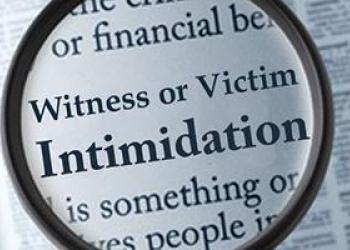
For an attorney to tell a potential victim or witness to a crime committed, or to be committed, by the
A defense attorney misrepresenting himself to be a deputy district attorney, while telling a person to contact him instead of the police should she be victimized by the attorney’s client in the future, may or may not be a violation of P.C. § 136(b)(1); Dissuading a Victim or Witness from Reporting a Crime. Therefore, due to the ambiguity of whether P.C. § 136(b)(1) applies to crimes that have not yet occurred, the Rule of Lenity dictates that the defendant be given the benefit of the doubt, protecting him from being criminally charged. Such an act, however, is a crime under P.C. § 137(b); Inducing a Witness by Fraud to Withhold Information.
Defendant Octavio Joseph Reyes was a Solano County Public Defendant with less than three years on the job when he was assigned to represent one Jacques Olivas. Olivas was charged with abusing his mother and resisting arrest. Defendant negotiated a plea deal on June 13, 2018, where Jacques Olivas pled “no contest” to the resisting arrest charge (per P.C. § 148(a)(1)), with all other charges dismissed. Put on probation, Olivas was ordered as a condition of his probation not to annoy, harass, or threaten his mother (Evelyn Olivas) and not to have any uninvited contact with her. It took less than two weeks (June 26) for Olivas to be returned to court with new charges filed and an allegation that he had violated his probation. On July 3rd, defendant worked another plea deal for Olivas where he admitted to the probation violation with the new charges being dismissed. Probation was reinstated with a new and revised protective order. Under this order, Olivas was to stay 100 yards away from his mother, and to stay away from her home. He was also not to have any personal, electronic, telephonic or written contact with her, or any contact through a third party “except any attorney of record.” This worked until August 28th, when new charges were filed (see below). In the meantime, DA Investigator Jerry Sanchez interviewed Olivas’ mother, Evelyn. She told him that on July 3, 2018, she received a call on her cellphone from defendant Reyes. Defendant identified himself as “Jacques’s district attorney.” He provided Evelyn with his e-mail address and telephone number, and told her that her son (Jacques Olivas) was going to be released that day. Evelyn told Investigator Sanchez that defendant told her that “if (Jacques) was near her home or at her home, not to call the police,” but instead “to call (defendant Reyes).” As a result of these instructions, Evelyn sent an e-mail to defendant on July 11th, to which she attached a letter to her son, Jacques. (Other than this, the record on appeal did not reflect what was in the e-mail or the letter, or any other information Evelyn might have passed onto defendant.) Defendant responded, saying he would “review these documents and get back to you.” Defendant also asked Evelyn for the phone number of Jacques’ former girlfriend, Darla Estes, with whom he had a child. Evelyn responded with an e-mail providing defendant with Estes's phone number. Darla Estes was also interviewed by Investigator Sanchez, who told him that defendant “told her to tell Evelyn not to call the police if the restraining order was violated, to call him.” On July 12th, Evelyn sent defendant another e-mail with an attached letter, the letter being addressed to “Joseph Reyes, district attorney.” There was no evidence indicating whether or not defendant had read this e-mail or whether he ever responded to it. Despite defendant’s instructions not to call the police, Evelyn called them anyway shortly after midnight on August 26th as her son (Jacques) attempted to get into her mobile home. Jacques Olivas was arrested by responding police at the scene, and after a struggle. Evelyn reported to the police that the trailer park manager told her several days earlier that Jacques had been “lingering in the trailer park that day.” After Jacques’ arrest on the 16th, Evelyn told the officers that she had not called the police on August 24th, when the trailer park manager told her about her son “lingering” at the trailer park, because “the district attorney had told her not to call the police if (he) violated the restraining order, but to call him instead.” Evelyn later repeated this allegation to Investigator Sanchez, adding the fact that she had tried to call defendant after hearing that her son was seen lingering in the trailer park, but was unable to reach him. After her son’s arrest on the 26th, she send defendant another e-mail, again attaching a letter which was addressed to “Joseph Reyes, district attorney.” Defendant did not respond to this e-mail, and there was no evidence that he’d received or read it. Defendant was later charged in state court with what was collectively referred to as “witness tampering;” i.e., P.C. § 136.1(b)(1); attempting to dissuade a victim or witness to a crime from reporting that victimization to law enforcement, and P.C. § 137(b); attempting to induce a person “by the use of fraud” to “withhold . . . true information pertaining to a crime” from law enforcement (this latter charge being added to the information filed in Superior Court after defendant had been held to answer to the P.C. § 136.1(b)(1) charge by the magistrate following a preliminary examination). Defendant filed a P.C. § 995 motion in Superior Court, moving to dismiss both charges. The Superior Court judge granted defendant’s motion as to both counts. The People appealed.





